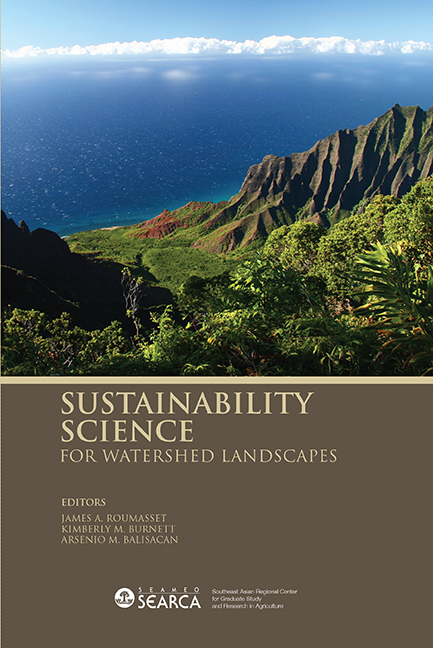Book contents
- Frontmatter
- Contents
- Tables
- Figures
- Message
- Foreword
- Preface
- Acknowledgments
- List of Contributors
- Theme 1 Sustainability Science for Resource Management and Policy
- Theme 2 Monitoring and Modelling
- Theme 3 Participatory Approaches
- Theme 4 Case Studies
- 10 Changing Land Use in the Golden Triangle: Where the Rubber Meets the Road
- 11 Effects of Feral Pigs (Sus scrofa) on Watershed Health in Hawaiʿi: A Literature Review and Preliminary Results on Runoff and Erosion
- 12 Sustainable Water Quality Management for Pacific Island Watersheds: Illustrations from American Samoa, Hawaiʿi, and Micronesia
- 13 The Transboundary Management of Groundwater Resources in Kumamoto, Japan
- Synthesis
10 - Changing Land Use in the Golden Triangle: Where the Rubber Meets the Road
from Theme 4 - Case Studies
Published online by Cambridge University Press: 21 October 2015
- Frontmatter
- Contents
- Tables
- Figures
- Message
- Foreword
- Preface
- Acknowledgments
- List of Contributors
- Theme 1 Sustainability Science for Resource Management and Policy
- Theme 2 Monitoring and Modelling
- Theme 3 Participatory Approaches
- Theme 4 Case Studies
- 10 Changing Land Use in the Golden Triangle: Where the Rubber Meets the Road
- 11 Effects of Feral Pigs (Sus scrofa) on Watershed Health in Hawaiʿi: A Literature Review and Preliminary Results on Runoff and Erosion
- 12 Sustainable Water Quality Management for Pacific Island Watersheds: Illustrations from American Samoa, Hawaiʿi, and Micronesia
- 13 The Transboundary Management of Groundwater Resources in Kumamoto, Japan
- Synthesis
Summary
ABSTRACT
Land use and land cover change in Montane Mainland Southeast Asia (MMSEA) is changing dramatically as shifting cultivation gives way to commercial agriculture driven by domestic demand and regional trade agreements. In Xishuangbanna, China, both owners of semi-privatised state farms and minority farmers are planting rubber at rates that threaten to transform landscapes, with elevations of between 300 m and even above 1,000 m, into an unbroken carpet of rubber. While it has become apparent that this region is on the cusp of major changes in tree cover, there is much uncertainty about the direction of change and the sustainability of this land use in terms of people's livelihoods and environmental variables such as biodiversity, carbon sequestration, watershed hydrology, and climate.
This paper explores the hydrological sustainability of this land-cover change at the basin scale, showing the importance of science for a sustainable water resources management policy. Observations in the study basin showed that water is an important and needed resource of rubber especially during the driest and hottest season. These results were not observed in native vegetation. This could also have negative large-scale implications on available local and regional water resources that need to be considered before launching land management policies.
INTRODUCTION
Montane Mainland Southeast Asia (MMSEA) is a large, ecologically vital region comprising approximately half the land area of Cambodia, Lao PDR, Myanmar, Thailand, Vietnam, and China's Yunnan Province (Figure 10.1). It is a region of great biological and cultural diversity that has come under close scrutiny in the last several decades as a result of both real and perceived deforestation, land degradation, and most recently, conversion of land from traditional agriculture, including shifting cultivation, to more permanent cash crops which are driven by regional and global markets (Fox and Vogler 2005).
- Type
- Chapter
- Information
- Sustainability Science for Watershed Landscapes , pp. 235 - 250Publisher: ISEAS–Yusof Ishak InstitutePrint publication year: 2010



